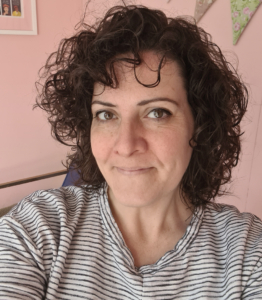
In this issue of AI Practitioner, it’s my pleasure to introduce Katy Fisher and her inspirational work. Her column, “Finding Magic in Strengths-Based Nursing”, offers a deeply personal account of how a single experience with a dementia patient named Irene transformed Katy’s understanding of nursing. Through the lens of Appreciative Inquiry, Katy explores the profound impact of connection, trust and holistic care on both patients and caregivers. Her story, rooted in the tender moments shared between Irene and her sister, illustrates the powerful potential of strengths-based care to create healing environments where compassion and human connection take precedence.
Download Voices from the Field
Keith Storace | Australia
Keith Storace is a Registered Psychologist with the Psychology Board of Australia (PsyBA) and Associate Fellow with the Australasian College of Health Service Management (ACHSM). He manages a private practice at Kiku Imagination where he applies the Appreciative Dialogue (ApDi) therapy program to assist individuals move toward, strengthen, and enjoy what is meaningful while dealing with the challenges they encounter along the way.
Katy Fisher | United Kingdom
Katy Fisher is currently co-host of the Caring Corner podcast and website and Senior Nurse (quality and Improvement) at NHS Professionals. After starting her career as an adult registered nurse practising in acute stroke, acute neurology, complex discharge planning and general medical nursing, she progressed to lead clinical governance, quality and risk-management frameworks in acute hospitals. She is passionate about making patient safety theory and methodology appreciative in a frontline healthcare setting. Website: https://caringcorner2. wordpress.com
Finding Magic in Strengths-Based Nursing
This is a story of how a single experience with a patient named Irene a pseudonym taught me the true essence of nursing – an experience that encompasses the aspects of Appreciative Inquiry (AI) that I now fight so hard for others to recognise. These events gave me trust in a strengths-based process, the poetic principle in action, and the importance of listening to my patients and their loved ones to provide holistic care.
I am now a senior nurse for quality and improvement working in the UK, a co-host and founder of a podcast focused on learning from Appreciative Inquiry in health and care, and I also work in patient safety, aiming to map out Appreciative Governance models. But essentially, I am a nurse and a human being.
I had peaked in nursing before I had even started, before I had even qualified. It took me twenty years to realise this, and approximately twenty seconds to be at peace with it.
Initial observations
I had just started working in a nursing home in the UK, before studying to be a nurse, where I witnessed an elderly woman with dementia, Irene, who continued to show signs of “agitation and aggression”. All I could see was fear and confusion, and the only time this abated was when her sister visited every two weeks.
Although non-verbal by this time, Irene’s movement changed: her head lifted slightly and her breathing calmed. It was incredibly hard for her sister, as they had lived together, shared wonderful memories and, up until recently, had at least been able to communicate verbally in some way. No-one had explained to me at that time the principles of connected community to support generativity in a dementia patient, or the importance of love in healing, but I realise only now, belatedly, that I could feel its magic then.
The power of connection
Irene’s sister sang to her every fortnight and, although no active reciprocation was witnessed, she took comfort in knowing that she was singing the song to her sister that their father had sung to them long ago. “Daisy, Daisy, give me your answer, do…” would ring through the lounge area for those brief moments, perhaps bringing some small relief to both sisters.
Challenges in the nursing home
To the care assistants, Irene was identified through handover as “regularly aggressive and can lash out, only deliver personal hygiene in pairs”. There was no specific preference of care, detail of what type of woman she was, and, as I started to realise, no real consideration of consent. The care plans lacked a personal touch, focusing more on Irene’s aggressive behaviour than on her needs as an individual. This systemic issue stemmed from time constraints and a lack of resources.
These reflections are not intended to dwell on the negative. As AI enthusiasts, we recognise the value of looking at the whole picture – the Wholeness principle, which emphasises understanding systems in their entirety rather than in isolated parts. With this in mind, there were many factors that may have contributed to a lack of time, resources or experience necessary to provide truly holistic care.
In my short time in the nursing home, I had started to understand that Irene’s “periods of aggression” centred around interventions happening to her. What little autonomy she still had was being taken away, and her world had become ever smaller. I was given strange looks by the other carers when I knocked on her door before entering, when I described who I was and why I was there, and when I stopped if she showed signs of fear – otherwise construed as aggression. Staff with good intentions had left the radio on in her room, but this also acted as a trigger for further confusion.
However, I couldn’t help but continue to think about the moment when Irene was at her best, when she was calm and at peace. Her sister did not live near her anymore, but was there a way I could bring some of that peace to her between the sister’s visits?
Personal approach, innovation and breakthrough moments
Inspired by Irene’s response to her sister’s visits, I began humming “Daisy Bell” during care routines. Gradually, Irene’s behaviour changed, building trust between us. I followed this same routine every morning and whenever Irene needed care. The care assistants were driven mad by hearing the same song repeatedly! However, I sensed a change in Irene – a certain trust – and that was all I needed. I continued with the process, and two weeks of the same routine brought about enough trust that only one person was needed in the room when Irene required care. It was a massive achievement, and it meant she was not as overcrowded and confused.
Her sister arrived to visit. She cupped Irene’s face in her hands, fed her grapes and talked about their lives. She read stories from the newspaper, helped her with her drink and sang to her again. To me, it was a small work of magic every time she calmed her and loved her.
Our routine continued the following week, and Irene continued to show calm and trust in the process. But something else was also happening – she started to hum.
At first, I couldn’t say for certain that this was meant as musical sound. Maybe it was a coincidence, but it certainly wasn’t aggressive. Over the coming week, there was no denying it – Irene was trying to sing along.
Reflection on nursing practice
Looking back, I realised the gap between the deficit-based approach in healthcare and the potential for holistic, appreciative care. Patients should be seen as whole persons, not just as their conditions.
I cannot express how much those moments changed my life and career. I didn’t have the words back then to talk about how to see patients, not as their condition, but as humans who love, feel and possess more strength than we ever know. That in twenty years’ time, I would promote the storytelling of health and care staff when they have witnessed the magic in their patients.
I wouldn’t have known at that time that the Poetic principle – a principle that suggests our past, present and future can be endless sources of learning, much like the endless possibilities in a book, film or song – was being applied by both her and me in a form of dance that would generate growth for both of us. That those episodes of care would be seen as appreciative interviews in some eyes.
What I would have deeply loved back then was for someone to say, “How did you do that?”, “What can we learn from this?” and “There must be more we can do”. What actually happened was a nursing career in a primarily deficit-based approach that could not put into words the magic that continually happened in-between the treatment, documentation and discharge processes.
The patient who said his first word following a stroke that had rendered him mute, the final breaths of an end-of-life patient made comfortable with their family around them, the gentle squeeze of a relative’s hand that said “thank you” – these are the real moments of wonder that bring people into work and give strength to an organisation and team.
Lasting impact
On a fateful Sunday, magic happened, marking the peak of my nursing career. It was a profound lesson in the power of love and connection in healing, underscoring the importance of holistic care and Appreciative Inquiry in nursing. By sharing this story, I hope to inspire others to recognise the magic in their patients and strive for compassionate care.
Irene’s sister visited that Sunday afternoon. She gently cupped Irene’s face, fed her grapes and talked about their lives. She read stories from the newspaper, helped her with a drink, and sang to her. Irene, without words, sang back, holding the tune while her loving sister wept. In that moment, I knew my nursing career had peaked, and I was entirely at peace with that.
NOTE: “Irene” is a pseudonym used to protect the patient’s confidentiality




This is SUCH a beautiful story/reflection Katy! It made me cry as it brought back very special moments of caring for my own mother who also had dementia when from nowhere we were gifted with moments of profound joy and surprise as she momentarily ’emerged’ and spoke, smiled, sang, told us off(!)… connected with us.
I had never made the connection with Appreciative Inquiry and it was only towards the end of her life that I was introduced to and used Appreciative Inquiry professionally. All I ever wanted (and tried to support/encourage in all the wonderful team of people who helped us) was for Mum to feel loved, safe, respected and listened too. But perhaps we were caring appreciatively without realising…
It’s fantastic that you are promoting strengths-based, appreciative methodology and patient safety theory in front-line healthcare – so immensely valuable and important.
Hi Rachel, I am so sorry- I have only seen this comment now. I don’t think you can get any more appreciative than carers of vulnerable patients who want everyone to see the whole human behind the role of ‘patient’. to hold space for them to be their true self as much as possible is an absolute gift and one of the hardest jobs for a family member to do. it is still one of my favourite nursing moments even though those moments grow more and more. Thankyou for taking the time to comment.